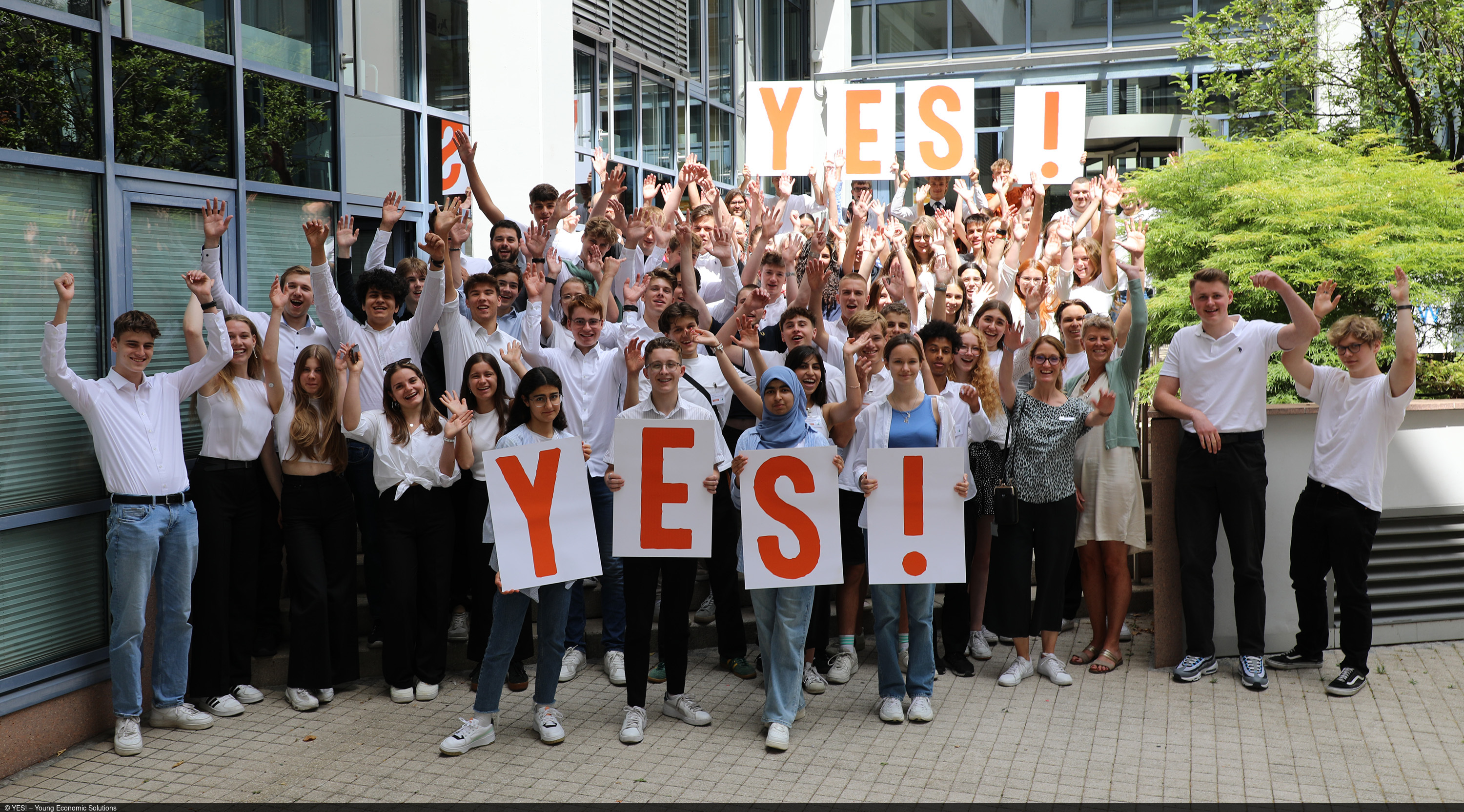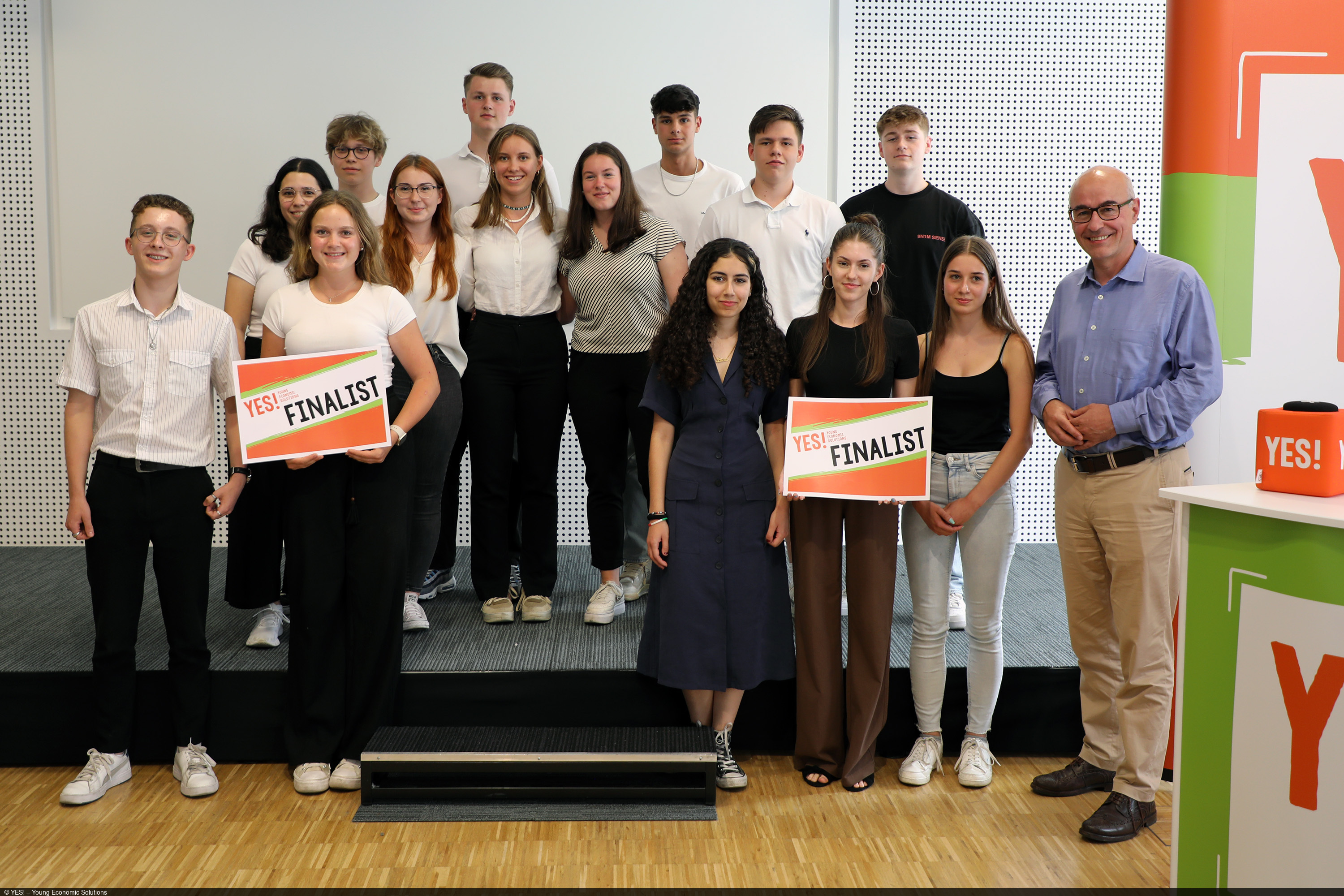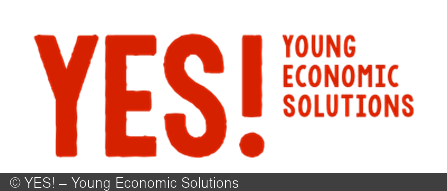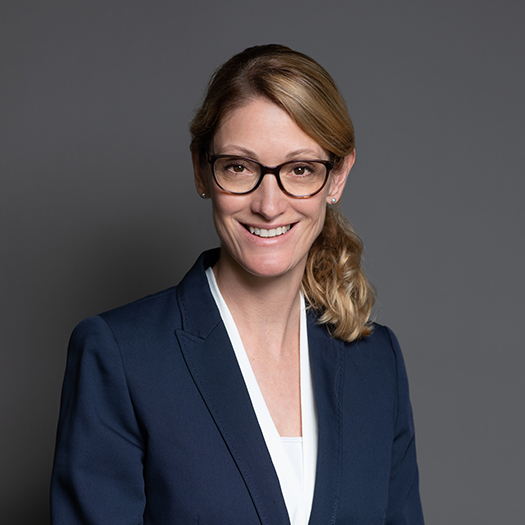Successful YES! Regional Final South-West at ZEW
Dates and NewsOnce Again, ZEW Team Qualifies for the Grand Final; Finance Topics Lead the Way
Packed house at ZEW Mannheim: Over 100 school students braved the heat to engage in passionate debates on topics like digital work and educational equity at the YES! Regional Final South-West. Now, out of the eight school teams, two groups with finance-related themes have made it to the final. Their message is clear: it’s time for politics to take action! Embracing the spirit of “It’s the financial economy, stupid!” these students are putting curricula and education policies in general to the test.
In his opening remarks, ZEW President Professor Achim Wambach emphasised the importance of fostering economic thinking from an early age. The regional final has shown that young people crave solid information about finances. They came up with innovative solutions, such as an app called “Cash Coach,” designed to playfully teach everyday financial knowledge. The school team tackling the topic “Attraktive Finanzbildung für junge Leute – wie geht das?” (“How to make financial education attractive for young people”) received support from ZEW economist Marius Cziriak and Manuel Vogler from the University of Mannheim.
Alongside the victorious team from Gymnasium St. Michael in Schwäbisch Hall, the Werner-Heisenberg-Gymnasium from Bad Dürkheim had already triumphed in the Regional Final West with their self-conceived board game on the same subject. On this hot summer day at ZEW, the second finalist was the team from Johann Philipp Bronner Schule in Wiesloch, presenting an idea for enhancing sustainable financial competence. Congratulations to all the winning teams! ZEW wishes them the best of luck for the grand final in Hamburg in September.
ZEW Employees behind the Scenes
Since 2020, our colleague Karla Schneider-Dörken, International Co-operation and Public Relations Officer at ZEW, has been in charge of the YES! high school competition and the direction of the yearly regional final in Mannheim. We asked her:
Why is ZEW involved with YES! – Young Economic Solutions, and how has the competition developed over the years?
Karla Schneider-Dörken: ZEW has been a participating partner since 2017 and was one of the first institutes to get involved. The fact that our teams continually reach the top spots in the competition is a reflection of their scientifically sound work that is made possible through our researchers. Our researchers work alongside the high school students to develop solutions for future issues in politics and society. It’s great that YES! has had so much success and is one of the largest competitions in Germany for young people grappling with economic and social issues. We appreciate that YES! promotes an active exchange of ideas between academia and schools and is committed to encouraging the next generation to confront economic issues. We are excited to continue our partnership into the future.
We also interviewed Marius Cziriak and Manuel Vogler about their motivations to get involved in the YES! competition. The two researchers mentored the winning team from the St. Michael Schwäbisch-Hall Gymnasium:
How long have you been working at ZEW (Cziriak) and the University of Mannheim (Vogler) and what is your current research focus?
Marius Cziriak: I have been a researcher at ZEW since 2020 in the Pensions and Sustainable Financial Markets Unit. My research focuses on financial education and household finances.
Manuel Vogler: Since 2021, I have been a researcher at the University of Mannheim under the Chair of Economic and Business Education – Instructional Systems of Design and Evaluation with Professor Carmela Aprea. I teach and research under the umbrella of general financial and economic education.
What motivated you to get involved in the YES! competition?
Marius Cziriak: I heard about the competition from my colleagues at ZEW and asked Manual about his involvement. We are both associated with the Mannheim Institute for Financial Education (MIFE) and have different research interests, but they complement each other quite well for this project.
Manuel Vogler: The competition gives us the opportunity to draw young people’s attention to the topic. It allows us to find out more about the needs of the target group and to learn from their ideas and suggestions, as well as to draw inspiration for our own research.
How did you come up with the topic and why is it relevant?
Marius Cziriak: Even though financial literacy is higher on the political agenda these days, Germany still finds itself in a worse position than other OECD countries in many respects. Germany also needs to catch up in terms of financial literacy among younger people.
Manuel Vogler: Along with the necessity of financial literacy, economic and business education is also constantly concerned with the question of what should be taught and how this can be done best.
Marius Cziriak: We had the impression that especially the target group itself can make a decisive contribution to making the topic interesting for other young people. With their enthusiasm, creativity and energy, the students know well what content to engage with to get themselves and their peers excited about the subject.
You backed two teams, both of which made it through the preliminary rounds into the final, so congratulations on that! How did you find the proposed solutions of your respective student teams?
Manuel Vogler: Both teams managed to take an innovative approach to imparting the content through playful learning. They were both successful in selecting the most important content for their target group and finding an appealing way to integrate it into the learning environment.
Marius Cziriak: Even though both teams started off from the same point, it was interesting to witness how much their approaches diverged. Alone or with others, digital or old-fashioned, at school or at home – there are many ways to gain financial literacy.
What was your experience of working with the student teams? What impressed you the most?
Marius Cziriak: The student teams had already read up well on the topic and were ready from the get-go with ideas. It especially impressed us that the teams were able to design surveys in no time and conduct them at their schools. As a result, they already had an empirically based overview of the learning needs and interests of their fellow students.
Manuel Vogler: The students already had an intuitive understanding of how the content could be engagingly presented in the learning environment. They knew how to best incorporate their ideas and suggestions into their projects. That is no small task, even for some researchers with many years of experience.
And last but not least: Why should researchers support the YES! project?
Marius Cziriak: Besides the exciting collaboration with interested young people, the competition also provides helpful insights into one’s own work. Young people can sometimes have a different point of view on social problems and can help us to develop new perspectives. In that way, we researchers can benefit from this as well.
Manuel Vogler: The YES! organising team is also available with advice and to answer your questions. This reduces the hassle so you can concentrate on your teams' concerns. You can also join in the excitement at the regional and national finals. We are keeping our fingers crossed for both teams at the national final!
About YES!
YES! – Young Economic Solutions is a joint project of the German National Library of Economics (ZBW) – Leibniz Information Centre for Economics and the Joachim Herz Stiftung in Hamburg. YES! is one of the biggest high school competitions in Germany looking at issues affecting the future of our world. Over the course of a six-month mentoring programme, student teams tackle pressing issues facing future generations. The students come up with their own solutions to global economic, ecological and social problems and present them as part of the YES! – Young Economic Solutions conference to other students. Researchers from various Leibniz institutions support the students by providing their scientific expertise.



